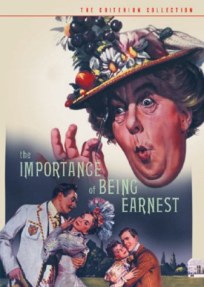| Revision as of 17:07, 23 March 2008 editSilkTork (talk | contribs)Administrators104,124 edits ref section & Great British Films← Previous edit | Revision as of 15:48, 17 May 2008 edit undo81.100.72.88 (talk)No edit summaryNext edit → | ||
| Line 19: | Line 19: | ||
| The film is largely faithful to Wilde's text, although it divides some of the acts into shorter scenes in different locations. Edith Evans's outraged delivery of the line "A ''hand''bag?" has become legendary. As actor ] has written, it is a performance "so acclaimed and strongly remembered that it inhibits audiences and actors years later" providing a challenge for any actress taking on the role of Lady Bracknell.<ref>Ian McKellen, , '']'', 13 April 1975.</ref> | The film is largely faithful to Wilde's text, although it divides some of the acts into shorter scenes in different locations. Edith Evans's outraged delivery of the line "A ''hand''bag?" has become legendary. As actor ] has written, it is a performance "so acclaimed and strongly remembered that it inhibits audiences and actors years later" providing a challenge for any actress taking on the role of Lady Bracknell.<ref>Ian McKellen, , '']'', 13 April 1975.</ref> | ||
| The cutting becomes perverse in (theatrical) Act Four where it starts throwing out the best jokes. It also supplies no reason for Lady Bracknell to know where Gwendolen is and follow her there - which is surreal in the wrong way. Earlier oddities include Algy asking why the giver of the cigarette case calls herself Cecily if she is Ernest's aunt, which makes no sense and sounds like a simple mistake. A political line is dumbed down for later audiences so as to result in Lady Bracknell equating Tories and Liberals - actually the opposite poles of the spectrum at the time. | |||
| ⚫ | The film is noted for its acting, yet the parts played by Redgrave and Denison call for actors ten years younger. | ||
| ⚫ | The film is noted for its acting, yet the parts played by Redgrave and Denison call for actors ten years younger. Redgrave would have been more youthful without his moustache. | ||
| The film stands as the most famous adaptation of an Oscar Wilde play. | The film stands as the most famous adaptation of an Oscar Wilde play. | ||
Revision as of 15:48, 17 May 2008
1952 British film| The Importance of Being Earnest | |
|---|---|
 | |
| Directed by | Anthony Asquith |
| Written by | Oscar Wilde Anthony Asquith |
| Produced by | Teddy Baird Earl St. John |
| Starring | Michael Redgrave Michael Denison Edith Evans Joan Greenwood Dorothy Tutin Margaret Rutherford Miles Malleson |
| Music by | Benjamin Frankel |
| Release dates | |
| Running time | 95 min. |
| Country | United Kingdom |
| Language | English |
The Importance of Being Earnest (1952) is a British film adaptation of the play by Oscar Wilde. It was directed by Anthony Asquith, who also adapted the screenplay, and was produced by Teddy Baird.
Adaptation
The film is largely faithful to Wilde's text, although it divides some of the acts into shorter scenes in different locations. Edith Evans's outraged delivery of the line "A handbag?" has become legendary. As actor Ian McKellen has written, it is a performance "so acclaimed and strongly remembered that it inhibits audiences and actors years later" providing a challenge for any actress taking on the role of Lady Bracknell.
The cutting becomes perverse in (theatrical) Act Four where it starts throwing out the best jokes. It also supplies no reason for Lady Bracknell to know where Gwendolen is and follow her there - which is surreal in the wrong way. Earlier oddities include Algy asking why the giver of the cigarette case calls herself Cecily if she is Ernest's aunt, which makes no sense and sounds like a simple mistake. A political line is dumbed down for later audiences so as to result in Lady Bracknell equating Tories and Liberals - actually the opposite poles of the spectrum at the time.
The film is noted for its acting, yet the parts played by Redgrave and Denison call for actors ten years younger. Redgrave would have been more youthful without his moustache.
The film stands as the most famous adaptation of an Oscar Wilde play.
Awards and nominations
The film received a BAFTA nomination for Dorothy Tutin as Most Promising Newcomer and a Golden Lion nomination for Anthony Asquith at the Venice Film Festival.
Cast
- Michael Redgrave as John Worthing
- Michael Denison as Algernon
- Edith Evans as Lady Bracknell
- Joan Greenwood as Gwendolen
- Margaret Rutherford as Miss Prism
- Miles Malleson as Canon Chasuble
- Dorothy Tutin as Cecily
See also
- The Importance of Being Earnest (original play by Oscar Wilde)
- The Importance of Being Earnest (2002 film version)
References
Notes
- Ian McKellen, "Ian McKellen on The Test of Time", The Observer, 13 April 1975.
Bibliography
- The Great British Films, pp 156-158, Jerry Vermilye, 1978, Citadel Press, ISBN 080650661X
External links
This film article about a 1950s comedy film is a stub. You can help Misplaced Pages by expanding it. |